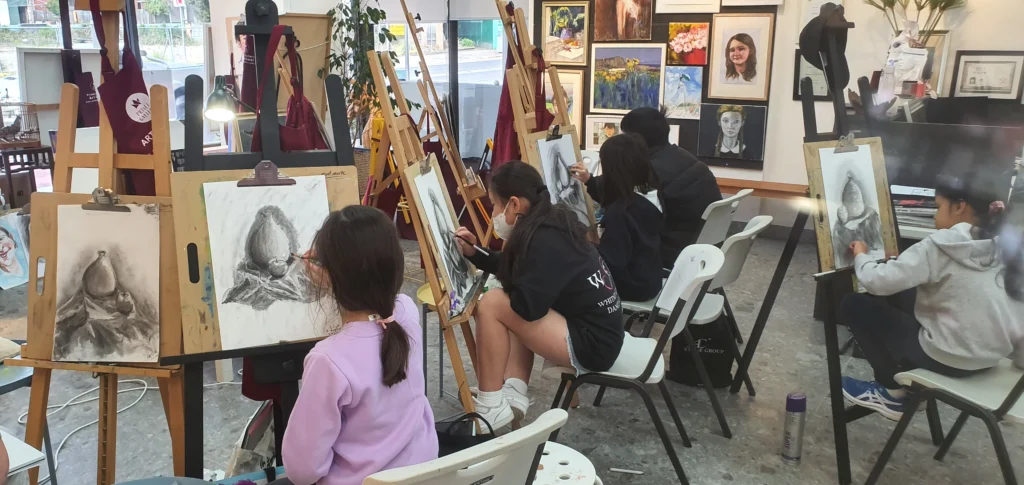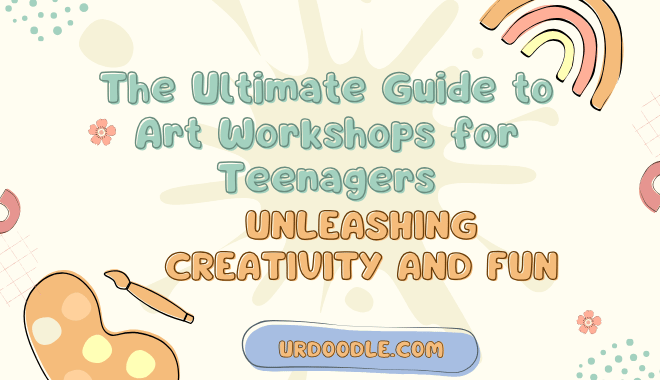Hey there, art enthusiasts and parents! If you’re on a quest to find the perfect art workshops for teenagers, you’ve landed in the right spot. We get it—navigating the world of teen art classes can be as tricky as deciphering a Picasso painting. But fear not! We’re here to make sense of it all and help you unleash the creative beast within your teen.
Art workshops are more than just painting and drawing; they’re about exploring creativity, boosting confidence, and having a blast along the way. In this article, we’ll dive deep into everything you need to know about art workshops for teenagers, from the different types available to what your teen can gain from them. Let’s get rolling!

Why Art Workshops for Teenagers?
A Creative Outlet
First off, let’s talk about why art workshops are a big deal. Teens are at a stage where they’re figuring out who they are and what they love. Art workshops give them a chance to express themselves freely and channel their inner thoughts and emotions onto a canvas, clay, or any other artistic medium. It’s like therapy but way more colorful and fun!
Skill Development
Art workshops aren’t just about splattering paint around (although that’s pretty fun too!). They’re structured to teach specific skills, whether it’s mastering the brushstroke, learning the basics of digital design, or understanding the nuances of color theory. Teens can pick up skills that might just shape their future careers.
Confidence Booster
There’s something incredibly satisfying about creating something from scratch. For teens, completing an art project can be a huge confidence booster. It shows them that they can set a goal, work towards it, and achieve it. Plus, it’s a great talking point for college applications!
Types of Art Workshops for Teenagers
When it comes to art workshops for teenagers, the variety is as broad as an artist’s palette. These workshops aren’t just about learning to draw or paint; they’re about exploring different mediums, discovering new passions, and honing diverse skills. Let’s break it down, looking at various types of workshops available, and what each can offer to an aspiring young artist.
1. Painting and Drawing Workshops
Traditional Painting
For teens who love the feel of a brush in their hand and the look of a blank canvas, traditional painting workshops are a perfect fit. These classes often cover:
- Watercolor Techniques: Teens learn to control water and pigment to create soft, ethereal images.
- Acrylic Painting: Offers a more vibrant and bold medium that dries quickly, perfect for layering.
- Oil Painting: A classic medium that teaches patience and technique, as oil paints take longer to dry.
Drawing Fundamentals
Drawing workshops are foundational, focusing on:
- Sketching Basics: Developing skills in line, form, and shading.
- Figure Drawing: Understanding human anatomy and proportions.
- Perspective Drawing: Teaching the principles of perspective to create depth and realism.
2. Digital Art Workshops
In this tech-savvy era, digital art workshops are incredibly popular among teenagers. They provide a gateway into modern artistic expressions and potential career paths in:
- Graphic Design: Using software like Adobe Illustrator to create logos, posters, and more.
- Digital Illustration: Crafting detailed and imaginative illustrations using programs such as Procreate.
- Animation: Introduction to both 2D and 3D animation, offering a glimpse into movie magic.
3. Sculpture and Pottery Workshops
For those who love getting their hands dirty, sculpture and pottery workshops offer a tactile experience that’s both challenging and rewarding. These workshops can include:
- Clay Modeling: Learning to shape and mold clay into beautiful sculptures.
- Pottery Wheel Basics: Mastering the wheel to create pots, bowls, and vases.
- Mixed Media Sculpture: Combining materials like wire, wood, and fabric to create innovative pieces.
4. Mixed Media Workshops
Mixed media workshops encourage experimentation across different mediums. Teens learn to:
- Combine Textures: Using paper, paint, fabric, and other materials to create layered art.
- Collage Art: Assembling images and textures to form a cohesive piece.
- Assemblage Art: Creating three-dimensional art from found objects.
5. Photography Workshops
Photography workshops teach teens to see the world through a different lens. Skills they acquire include:
- Camera Basics: Understanding settings, lighting, and composition.
- Photo Editing: Using software like Adobe Lightroom to enhance images.
- Themed Photography: Focusing on specific themes such as nature, portrait, or urban landscapes.
6. Printmaking Workshops
Printmaking is an ancient art form that’s seeing a resurgence among young artists. Workshops might cover:
- Linocut and Woodcut: Carving designs into linoleum or wood blocks to print onto paper.
- Screen Printing: Learning to transfer designs onto fabric or paper using a screen and ink.
- Monoprinting: Creating unique, one-off prints using various tools and techniques.
7. Fashion Design Workshops
For teens with a flair for style, fashion design workshops offer a creative outlet. These classes usually include:
- Sketching and Illustration: Drawing fashion figures and designing clothing.
- Fabric Selection and Sewing Basics: Understanding materials and basic sewing techniques.
- Creating a Collection: Designing a cohesive line of clothing from concept to creation.
8. Theater and Performance Art Workshops
These workshops combine visual art with performance, perfect for teens who love drama and storytelling. They might experience:
- Set and Costume Design: Creating visual elements that bring a story to life.
- Performance Art: Blending art with live performance in a creative expression.
- Puppetry and Mask Making: Crafting elements that play a role in theatrical performances.
9. Art Therapy Workshops
While not purely art-focused, these workshops use art as a tool for emotional and psychological exploration. Teens can benefit from:
Group Art Projects: Encouraging collaboration and communication among peers.
Expressive Arts: Using art to express emotions and explore personal themes.
Mindfulness and Art: Combining meditation techniques with creative practices.
With such a wide array of options, there’s a workshop for every teen, whether they dream of illustrating graphic novels, designing haute couture, or simply want to explore the joy of creating. Encouraging them to try different types can help uncover hidden talents and passions, setting them on a path of lifelong creativity and expression. Each type of workshop offers unique skills and experiences, contributing to a well-rounded artistic education that can inspire, challenge, and engage teenagers in meaningful ways.
Choosing the Right Workshop
Selecting the perfect art workshop for your teenager can feel like navigating a maze of endless possibilities. With so many options available, it’s essential to consider several factors to ensure that the experience is enriching and enjoyable for your teen. Here’s an expanded guide to help you make an informed decision.
Understanding Your Teen’s Interests and Goals
Before diving into the world of art workshops, take some time to understand your teen’s interests and aspirations. This is crucial in guiding them towards a workshop that aligns with their passions and future goals.
- Passion Assessment: Sit down with your teen and discuss what they love about art. Are they drawn to painting, or do they prefer digital mediums? Understanding their passion will help narrow down the options.
- Career Aspirations: If your teen is considering a career in art, look for workshops that offer advanced skills and techniques relevant to their desired field, such as graphic design or animation.
- Hobby vs. Professional Path: Determine whether your teen is pursuing art as a hobby or with professional aspirations. This will influence whether you choose a more relaxed, fun workshop or one with a more structured curriculum.
Evaluating Workshop Types and Offerings
Once you have a clearer picture of your teen’s interests, start evaluating different types of workshops and what they offer.
- Workshop Focus: Identify workshops that align with your teen’s interests, whether it’s traditional painting, digital art, sculpture, or photography. Each type has unique benefits and teaching methods.
- Skill Level: Ensure the workshop matches your teen’s skill level. Beginners may require foundational courses, while more experienced teens may benefit from workshops that challenge their skills.
- Hands-On Experience: Look for workshops that offer plenty of hands-on practice. Art is best learned by doing, so ensure there’s a balance between instruction and practical application.
Researching Instructors and Their Teaching Styles
The quality of instruction can significantly impact your teen’s workshop experience. Researching instructors and understanding their teaching styles is a key step.
- Instructor Credentials: Investigate the background and qualifications of potential instructors. Look for those with experience in teaching teens and a strong portfolio of work.
- Teaching Style: Consider whether the instructor’s teaching style meshes well with your teen’s learning style. Some instructors may focus on technical skills, while others encourage creativity and experimentation.
- Reputation and Reviews: Look for reviews or testimonials from past students and parents. Positive feedback can indicate a supportive and effective teaching environment.
Considering Practical Aspects
Beyond interests and instruction, practical considerations play a significant role in choosing the right workshop.
- Location and Accessibility: Choose a workshop that’s conveniently located to avoid long commutes, which can be tiring for both you and your teen. Check if there are online options available if location is an issue.
- Schedule and Duration: Ensure the workshop fits into your teen’s schedule, especially if they have other commitments like school or extracurricular activities. Consider whether a short-term workshop or a more extended course is preferable.
- Cost and Materials: Evaluate the cost of the workshop and whether it includes materials. Some workshops might require additional purchases for art supplies, so factor this into your budget.
Encouraging Exploration and Flexibility
It’s essential to approach the selection process with an open mind, encouraging your teen to explore different workshops.
Feedback and Adjustment: After attending initial sessions, discuss with your teen what they enjoy and what could be improved. Be open to making adjustments if it’s not the right fit.
Trial Classes: If possible, attend a trial class to see if the workshop is a good fit. This can provide insight into the workshop’s environment and curriculum.
Openness to New Experiences: Encourage your teen to try something new. A workshop slightly outside their comfort zone might lead to unexpected interests or skills.
Choosing the right art workshop for your teen is about creating a personalized journey that nurtures their creativity and skills. By considering their interests, evaluating workshop offerings, researching instructors, and managing practical considerations, you can ensure that your teen’s artistic experience is both fulfilling and inspiring. Remember, the goal is to foster a love for art that will stay with them for life, providing joy and expression in their personal and professional endeavors.
Benefits of Art Workshops for Teens
Art workshops for teenagers offer a treasure trove of benefits that extend far beyond the canvas. They provide a unique environment where young minds can explore, express, and evolve, contributing to their overall development in various ways. Let’s delve into the numerous advantages these workshops offer, and why they are an invaluable experience for any teen.
1. Enhanced Creativity and Innovation
Art workshops are a sanctuary for creativity. They provide teens with the tools and freedom to express their imagination without boundaries.
- Creative Exploration: These workshops encourage teens to explore different mediums and techniques, fostering an environment where creativity can flourish. Teens learn to think outside the box, experiment with new ideas, and find unique solutions to artistic challenges.
- Innovation Skills: By working on diverse projects, teens develop the ability to innovate. They learn to approach problems from various angles, a skill that is invaluable in both artistic pursuits and everyday life.
2. Improved Focus and Patience
Creating art requires concentration and dedication, qualities that are honed through regular practice.
- Attention to Detail: Art workshops teach teens to pay attention to detail, whether it’s perfecting a brushstroke or capturing the right light in a photograph. This focus can improve their performance in academic subjects that require precision and concentration.
- Patience and Perseverance: Art projects often take time to complete. Teens learn the value of patience and perseverance as they work through various stages of creation, understanding that great results come from sustained effort.
3. Boosted Confidence and Self-Esteem
Completing an art piece provides a sense of accomplishment and boosts self-esteem.
- Sense of Achievement: Finishing an artwork gives teens a tangible sense of achievement. Displaying their work in galleries or sharing it online further enhances their confidence, as they receive appreciation and feedback from peers and instructors.
- Personal Expression: Art allows teens to express their identities and emotions. This self-expression is crucial during adolescence, helping them to articulate thoughts and feelings that might be difficult to convey otherwise.
4. Enhanced Communication Skills
Art is a powerful form of communication, and workshops help teens harness this potential.
- Visual Storytelling: Through art, teens learn to tell stories and convey messages visually. This skill is essential in a world where visual communication is increasingly important.
- Art Critiques and Feedback: Participating in critiques teaches teens to give and receive constructive feedback. They learn to articulate their thoughts on art and develop the confidence to present their ideas clearly.
5. Stress Relief and Emotional Well-being
Art is therapeutic. It offers a peaceful escape from the pressures of daily life, providing mental and emotional benefits.
- Stress Reduction: The act of creating art can be meditative, helping to reduce stress and anxiety. Workshops provide a space where teens can focus solely on the creative process, offering a break from academic and social pressures.
- Emotional Expression: Art workshops encourage teens to explore and express their emotions. This emotional release is essential for mental well-being, allowing them to process feelings creatively.
6. Social Skills and Teamwork
Art workshops often involve collaboration, teaching teens important social skills.
- Collaboration and Team Projects: Many workshops include group projects that require teamwork. Teens learn to collaborate, share ideas, and work together towards a common goal, building essential interpersonal skills.
- Diverse Interaction: Workshops bring together teens from different backgrounds, fostering an environment of diversity and inclusion. Interacting with peers who have different perspectives broadens their worldview and enhances social skills.
7. Exposure to Cultural and Artistic Diversity
Art workshops expose teens to a variety of artistic styles and cultural influences.
- Cultural Appreciation: Through exposure to different art forms and styles, teens gain an appreciation for cultural diversity. They learn about global art movements and the cultural significance behind various artistic expressions.
- Inspiration from Diversity: Experiencing diverse art forms can inspire teens to incorporate different elements into their own work, enriching their creative repertoire.
8. Foundation for Future Careers
For teens considering a career in the arts, workshops provide foundational skills and insights.
- Portfolio Development: Workshops help teens build a strong portfolio, essential for applying to art schools or pursuing artistic careers. They receive guidance on selecting and presenting their best work.
- Career Exploration: Through exposure to different art disciplines, teens can explore potential career paths in fields like graphic design, animation, or fine arts. Workshops often provide insights into the professional art world, including industry trends and opportunities.
9. Lifelong Skills and Hobbies
The skills learned in art workshops extend beyond adolescence, offering lifelong benefits.
- Problem-Solving Skills: Art encourages critical thinking and problem-solving, skills that are transferable to any field. Teens learn to brainstorm, plan, and execute projects, building resilience and adaptability.
- A Lifelong Hobby: Even if they don’t pursue art professionally, workshops instill a love for creativity that can become a lifelong hobby. Art provides a fulfilling way to spend leisure time and a means of personal expression throughout life.
Art workshops for teenagers are more than just creative outlets; they are catalysts for personal growth and development. By participating in these workshops, teens gain a multitude of benefits that contribute to their overall well-being and success. Whether it’s boosting creativity, enhancing communication skills, or providing emotional relief, art workshops offer invaluable experiences that shape the lives of young artists. Encouraging your teen to partake in these workshops is an investment in their future, fostering a well-rounded development that will serve them in countless ways.
Real-Life Success Stories
Enough theory! Let’s dive into some real-life success stories to see how art workshops have transformed the lives of teenagers.
Case Study 1: Emily, the Budding Illustrator
Emily always loved drawing in her spare time, but she never thought it could be more than a hobby. After joining a digital art workshop, she discovered a passion for illustration. The skills she learned helped her create a portfolio that landed her a scholarship to a prestigious art school.
Case Study 2: Jake, the Future Photographer
Jake had a knack for capturing moments on his smartphone. His parents enrolled him in a photography workshop, where he learned about composition and editing. Jake’s photos now hang in local galleries, and he’s considering a career in photography.
Case Study 3: Mia, the Confident Sculptor
Mia struggled with confidence issues but found solace in a sculpture workshop. The process of molding clay into art allowed her to express herself in ways words couldn’t. Her newfound confidence has spilled over into her schoolwork and social life.
Tips for Parents
If you’re a parent reading this, you might be wondering how to support your teen’s artistic journey. Here are some tips to keep in mind:
Encourage Exploration
Let your teen explore different types of art to find what they love. Encourage them to experiment and try new things, even if it means getting a little messy.
Provide a Creative Space
Create a designated space at home where your teen can freely create. Stock it with art supplies and allow them to make it their own creative haven.
Celebrate Their Achievements
Celebrate your teen’s artistic achievements, no matter how big or small. Show interest in their work and attend any exhibitions or showcases they participate in.
Be Patient and Supportive
Art is a journey, not a destination. Be patient with your teen as they learn and grow. Offer support and encouragement along the way.
Conclusion: Unleash the Artist Within
Art workshops for teenagers are more than just a fun activity—they’re a gateway to self-expression, skill development, and personal growth. Whether your teen is a budding Picasso or just looking for a creative outlet, there’s a workshop out there for them.
So, take the plunge and enroll your teen in an art workshop today. Who knows? They might just discover a lifelong passion that shapes their future. And remember, at the end of the day, it’s all about having fun and letting creativity flow. Happy creating!



